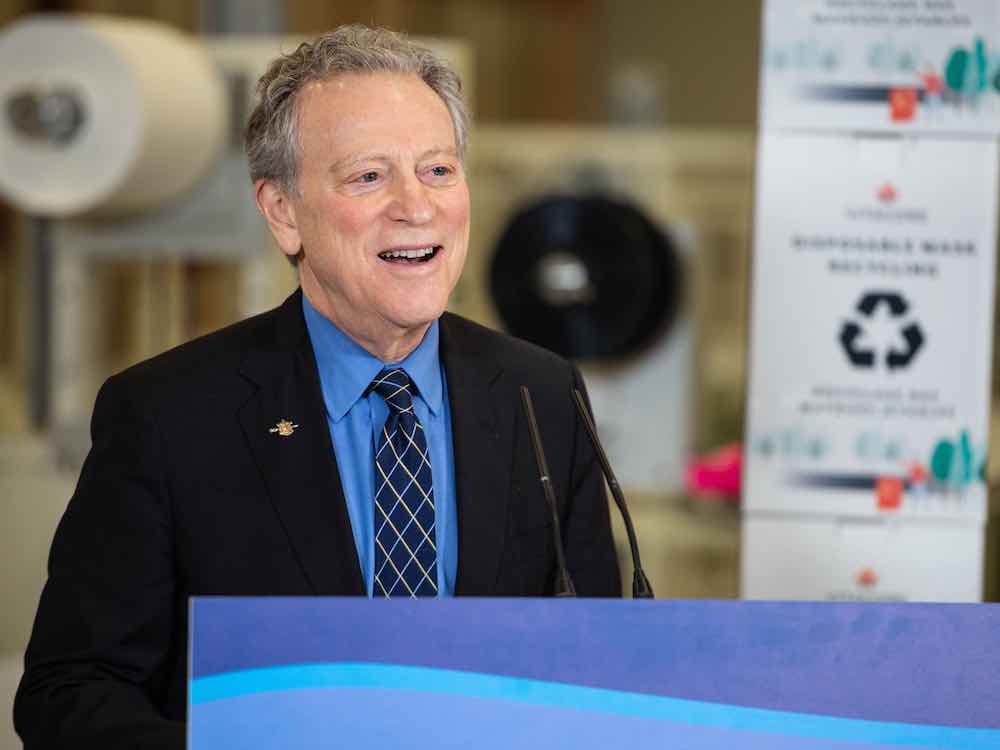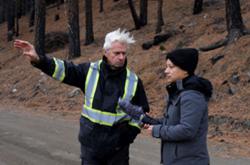BC United accused the NDP government of having the worst greenhouse gas emissions record in Canada Tuesday, but Climate Minister George Heyman said the claim is based on inaccurate data from the federal government.
B.C.’s record will look much better when the data is corrected, he said.
BC United climate change critic Renee Merrifield led the charge in question period Tuesday, citing numbers in a 2024 federal government report released last week. The “National Inventory Report 1990-2022” is Canada’s submission under the United Nations Framework Convention on Climate Change.
Emissions have dropped in nearly every other province since 2016, Merrifield said, but not in B.C.
“Under this NDP government emissions are on the rise,” she said. “The premier promised results but has delivered only increasing emissions and higher costs for gas, groceries and heating.”
The federal report found that emissions were lower in seven provinces — including Alberta, Ontario and Quebec — than they had been before the pandemic, and overall the country’s greenhouse gas emissions had trended down from 2005, showing a 7.1 per cent drop.
B.C., however, again appeared to be a laggard with persistently high emissions.
With 64 megatonnes of carbon dioxide equivalent in emissions in 2022, the province emitted as much greenhouse gas as it had before the COVID-19 pandemic dip and slightly more than it had in 2005.
In an interview Monday and responding to Merrifield in the legislature Tuesday, Heyman, the minister of environment and climate change strategy, said the federal government’s numbers are inaccurate and he expects they will be fixed in future reports.
“The emissions inventory changes because the federal government doesn’t have accurate data on methane emissions to establish a baseline many years back,” Heyman said in the legislature. “They admit this in their report, which I wish the member had read fully.”
He quoted part of the report that said the oil and gas industry in B.C. has one of the lowest emission intensities in the world and another that acknowledged that the baseline the federal government used for calculating emission reductions is flawed.
“The expected upward revisions of pre-2020 emissions in next year’s report would result in a larger reduction in intensity since 2012,” he said, quoting from the report.
Peter Milobar, the BC United finance critic, rejected the explanation. “In fact, our emissions in B.C. are higher and going up compared to every other province in the country,” he said, “and suddenly it’s the federal government’s fault. Once again, it would be wonderful if this government ever took responsibility for their failed actions.”
The Sierra Club BC also said it was “very concerned” about B.C.’s emissions and their increase since B.C.’s 2007 baseline year.
“The new data shows the province is drastically behind on its goal to reduce emissions by 40 per cent by 2030,” the environmental group said in a statement last week. “Provincial emissions would now need to be reduced by more than five per cent per year to meet this goal. The task will be even harder if new LNG terminals that are proposed or under construction go into operation.”
Heyman told The Tyee Monday that B.C. is doing better than it appears from the totals in the federal inventory. “We don’t agree with the number in the report,” said Heyman, “and we don’t think the federal government does either, but it’s the only number they have and they have a duty to report it.”
There is a substantial difference on accounting for methane emissions, he said, with the federal government recognizing only a 14 per cent reduction where the province calculates a cut of 47 per cent. Methane emissions make up nearly a fifth of Canada’s greenhouse gas emissions.
“The federal government’s methane emissions measuring data set is, by their own admission, not accurate,” Heyman said. “They are working with the B.C. government. We have leading methane emission measuring technology in Canada to ensure that next year’s report is more accurate.”
A footnote in last week’s federal report noted, “Emission estimates for this source are currently under review and upward revisions to CH4 [methane] emissions in the years prior to 2020 are anticipated in the 2025 edition of this report, pending further data collection and analysis.”
Recognizing that methane emissions were higher in the past than previously thought will make it clear that reductions have been significant, Heyman said, adding that the province is also taking steps to reduce methane emissions 75 per cent by 2030 and nearly eliminate them by 2035.
Getting the figure right will make a significant difference to the calculation of B.C.’s total emission reductions, he said. “We stand by our figures that we’ve had a five per cent reduction in emissions overall since 2018.”
In 2021 the B.C. government released a Roadmap to 2030 that built on the earlier CleanBC plan to show how it would meet the legislated goal of a 40 per cent drop below 2007 levels by 2030. B.C.’s climate change accountability law requires deeper cuts by 2040 and 2050.
The government missed a previous goal of a 33 per cent reduction by 2020, with emissions instead remaining more or less unchanged from 2007 levels.
“We have a long way to go,” Heyman said. “We know that, but we have programs and policies and rebates and incentives in place that are starting to take root throughout our communities and throughout our economy and we expect the trend to be significantly rising emission reductions.”
The Sierra Club BC’s senior policy and science adviser, Jens Wieting, said B.C. has made decisions that will make its emission reduction targets harder to meet.
“What worries me is that B.C.’s oil and gas emissions trend is pointing in the wrong direction,” he said.
When LNG Canada goes into operation next year as planned, it will add millions more tonnes of pollution, Wieting said. The facility, which may be followed by a second phase that’s already been approved, is the first of half a dozen liquefied natural gas projects planned or approved in the province.
“We need stronger policy to address the risk of more LNG terminals and massive growth in fracking, making it all but impossible to meet the oil and gas target, or our overall climate targets for B.C.,” said Wieting. ![]()
Read more: Energy, BC Politics, Environment

















Tyee Commenting Guidelines
Comments that violate guidelines risk being deleted, and violations may result in a temporary or permanent user ban. Maintain the spirit of good conversation to stay in the discussion and be patient with moderators. Comments are reviewed regularly but not in real time.
Do:
Do not: